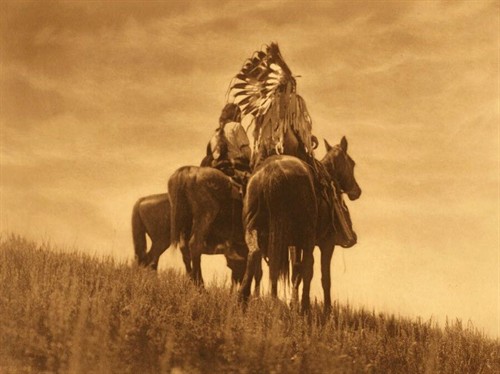With the
buffalo being driven to extinction by white guns, the Cheyenne and
Arapaho pushed back. Half a dozen violent encounters took
place between Indians and settlers on the Oregon Trail. The
federal government was not honoring its side of the Fort Laramie
treaty, and something had to be done or they would
perish.
click here for more
In Jefferson
Davis' last official act as secretary of war, he directed a
campaign against the Cheyenne in order to punish them for
hostilities against whites settlers. They must be
'"severely punished," said Davis, "and no trifling or partial
punishment will suffice."

By right of the treaty at
Horse Creek, the Cheyenne and Arapaho held title to the land
between the North Platte and the Arkansas rivers. In 1854,
the eastern boundary of their territory had crumbled under the
weight of settlers in the Kansas Territory, and the federal
government did nothing to protect their treaty rights. The
migration routes of the buffalo - across the central plains of
Kansas and Nebraska - was now broken in two by emigrant roads which
the buffalo would not cross. Their winter camping grounds on
the eastern slope of the Rockies had been taken over by gold
diggers. By 1859, more than 100,000 'fifty-niner's'
were in the Pike's Peak country.
At the
conclusion of the Horse Creek Treaty, Fitzpatrick predicted that
the freedom of the plains Indian would be vanquished by the white
man in one more lifetime. His prediction, only five years
old, was already coming to pass. Historian S.J. Killoren
wrote : "It was one of the most flagrant and serious violations of
the guarantees made to the Plains' tribes by the Fort Laramie
treaty. Moreover, the invasion of Indian country by settlers
was specifically prohibited by the Kansas/Nebraska Act of
1854. Also, where were the white troops to protect Indian
rights. And while this was a depredation far more excessive
than any Indian attack on an emigrant wagon train, it occasions no
government condemnation. The War department fielded no
expeditionary force to punish and remove the invaders and thus
maintain the promised peaceful coexistence. The Indian
office, with direct responsibility, never filed a single complaint
with the department of war, or petition Congress to enforce the
treaty conditions. The trader William Bent noted in 1859 that
the gold miners had quickly taken over choice Indian country and
brought " many causes of irritation" to the land's owners.
Now they were being pressed into a small territory that was beset
by the constant parade of emigrants from Texas, Kansas, and the
Platte, and bisected into even smaller segments by criss-crossing
roads."
Bent
foreshadowed things to come in his annual report to Washington: "A
smothered passion for revenge agitates these Indians, perpetually
fomented by the failure of food, the encircling encroachments of
the white population, and the exasperating sense of decay and
impending extinction with which they are surrounded."
The days when
the nomadic tribes of the American West were the freest people to
walk the Earth, were quickly drawing to an end. These were
the first of the Plains tribes to experience this American tragedy,
and sadly, this grim and unyielding fate had become their legacy
from the lofty promises made to them at Horse Creek less than ten
years before.
In a footnote
to his commentary, Killoren writes that Agent Albert G. Boone,
Fitzpatrick's successor at the Platte River Agency, was directed by
Commissioner A.B. Greenwood to push the treaty signing with the
Cheyenne or "to make it over their heads." This new and
amended treaty was not ratified by the U.S. Senate until August 6,
1861. In the meantime, Kansas was admitted to the Union
without having title to the land. This was a violation of
both the Kansas/Nebraska Act, the treaty with France ceding
Louisiana to the U.S., and to the conditions of the treaty at Horse
Creek. No one in Congress raised a voice in protest.
Related People
Related Events
Related Flashpoints